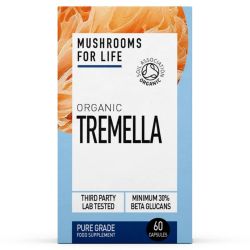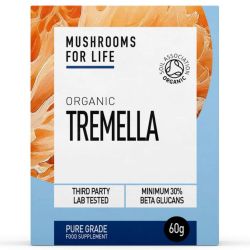Snow Fungus Mushroom Supplements
Snow Fungus mushrooms have a range of potential health benefits but are generally taken in supplement form because they are very hard to grow at home. They are available in both powder and capsule form.
All you need to know about Snow Fungus
What are Snow Fungus Mushrooms?
Snow fungus mushrooms, also known as Tremella fuciformis or silver ear mushrooms, are a species of edible fungus belonging to the Tremellaceae family. These mushrooms are commonly found in tropical and subtropical regions, particularly in East Asia, and have been used for centuries in traditional Chinese medicine and culinary practices.
What do Snow Fungus Mushrooms do?
We are still learning more about the make-up of Snow Fungus Mushrooms but here are some of the bioactive substances and compounds that have been identified:
-
Polysaccharides: Snow fungus mushrooms are rich in polysaccharides, including β-glucans, heteropolysaccharides, and acidic polysaccharides. These complex carbohydrates have been studied for their immunomodulatory, antioxidant, and potential anticancer properties. Polysaccharides from snow fungus mushrooms are believed to help modulate the immune system, enhance immune function, and scavenge free radicals.
-
Proteins and Amino Acids: Snow fungus mushrooms contain proteins and amino acids that contribute to their nutritional value. These include essential amino acids necessary for human health and protein synthesis. Proteins and amino acids from snow fungus mushrooms support various physiological functions in the body and may play a role in muscle growth, repair, and overall health.
-
Polysaccharide-Protein Complexes: Some bioactive compounds in snow fungus mushrooms exist as polysaccharide-protein complexes, which may exhibit synergistic effects and enhance their therapeutic properties. These complexes have been studied for their immunomodulatory, antioxidant, and potential anti-inflammatory effects.
-
Triterpenoids: Snow fungus mushrooms contain triterpenoids, a class of compounds with diverse biological activities. Triterpenoids found in snow fungus mushrooms, such as ergosterol peroxide and tremulacin, have been studied for their potential anticancer, anti-inflammatory, and antiviral properties.
-
Nucleotides: Snow fungus mushrooms contain nucleotides, including adenosine and uridine, which are involved in various physiological processes in the body. Nucleotides from snow fungus mushrooms have been studied for their potential immunomodulatory, anti-inflammatory, and antioxidant effects.
-
Phenolic Compounds: Snow fungus mushrooms contain phenolic compounds, such as phenolic acids and flavonoids, which possess antioxidant properties. These compounds help neutralize harmful free radicals, reduce oxidative stress, and protect cells from damage caused by reactive oxygen species.
-
Vitamins and Minerals: Snow fungus mushrooms are a good source of vitamins and minerals, including vitamin D, vitamin B2 (riboflavin), iron, and calcium. These nutrients play essential roles in metabolism, immune function, and overall health and well-being.
What are the benefits of taking Snow Fungus Mushrooms?
Snow Fungus Mushrooms are believed to have a range of health benefits including:
- Moisturizing and Hydrating: Snow fungus mushrooms are often used in skincare and beauty products for their hydrating and moisturizing properties. They are believed to help promote skin health, improve complexion, and reduce signs of aging.
- Immune Support: Snow fungus mushrooms contain polysaccharides and other bioactive compounds that may help modulate the immune system and support immune function.
- Anti-Inflammatory Effects: Compounds found in snow fungus mushrooms have been studied for their potential anti-inflammatory properties, which may help reduce inflammation and related health conditions.
- Antioxidant Protection: Snow fungus mushrooms are rich in antioxidants, which help neutralize harmful free radicals and protect cells from oxidative damage.
How long does it take Snow Fungus Mushrooms to work?
The time it takes for Snow Fungus mushrooms to produce noticeable effects can vary depending on several factors, including the individual's health status, the specific health condition being targeted, the dosage used, and the form in which Snow Fungus mushrooms are consumed (e.g., fresh, dried, supplement).
-
Type of Benefits:
- Skin Health: Snow Fungus mushrooms are often used in skincare and beauty products for their hydrating and moisturizing properties. Some individuals may notice improvements in skin hydration and texture relatively quickly after using Snow Fungus-based skincare products.
- Immune Support: Snow Fungus mushrooms contain bioactive compounds that may help support immune function. While immune-boosting effects may vary among individuals, some people may experience improvements in immune function over time with consistent consumption.
-
Consistency and Dosage:
- Consistently consuming Snow Fungus mushrooms over an extended period may lead to more pronounced and sustained effects compared to sporadic use. Higher dosages or more concentrated forms of Snow Fungus mushroom supplements may also yield faster results.
-
Individual Variability:
- Individual responses to Snow Fungus mushrooms can vary based on factors such as metabolism, genetics, overall health, and the presence of underlying health conditions. Some people may notice improvements sooner than others, while for some, it may take longer to observe any noticeable effects.
-
Form of Consumption:
- Snow Fungus mushrooms can be consumed in various forms, including fresh, dried, or as supplements. The form in which they are consumed may influence how quickly their beneficial compounds are absorbed and utilised by the body.
When is the best time to take Snow Fungus Mushrooms?
Here are some considerations to help determine the optimal timing:
-
For Culinary Use:
- Snow Fungus mushrooms are commonly used in cooking, particularly in Asian cuisine, for their unique texture and mild flavor. They can be incorporated into soups, desserts, beverages, and other dishes.
- Consider adding Snow Fungus mushrooms to recipes that call for their use, such as soups, stews, congee (rice porridge), desserts, and sweet drinks.
-
For Skincare and Beauty:
- Snow Fungus mushrooms are also used in skincare and beauty products for their hydrating and moisturizing properties. They are often included in moisturizers, serums, masks, and other skincare formulations.
- Skincare products containing Snow Fungus extract or essence can be used as part of your daily skincare routine. Apply them in the morning and/or evening after cleansing and before moisturizing.
-
For Medicinal Purposes:
- If you're taking Snow Fungus mushrooms for their potential health benefits, such as immune support or skin hydration, the timing of consumption may depend on the specific health condition being targeted.
- Some people prefer to take Snow Fungus mushroom supplements with meals to aid digestion and maximize absorption of nutrients. Others may choose to take them between meals or at a separate time of day.
-
Consistency is Key:
- Regardless of the specific timing, consistency is essential for maximizing the potential benefits of Snow Fungus mushrooms. Aim to include them regularly in your diet or supplementation routine to support long-term health outcomes or skincare goals.
-
Personal Preference:
- Ultimately, the best time to take Snow Fungus mushrooms depends on your personal preferences, lifestyle, and the specific purpose for which you are using them. Experiment with different timing options to determine what works best for you and fits seamlessly into your daily routine.
What are the side effects of Snow Fungus Mushrooms?
Snow Fungus mushrooms are generally considered safe for most people, and they are well tolerated when consumed as a food or supplement.
That said if you experience any kind of common allergic reaction (e.g. Itchy Skin, Rashes) then you should immediately stop using them.
Can I take Snow Fungus Mushrooms everyday?
How do I grow Snow Fungus Mushrooms at home?
Growing Snow Fungus mushrooms at home can be a bit more challenging compared to other types of mushrooms, as they typically require specific environmental conditions and substrates for cultivation. Snow Fungus mushrooms (Tremella fuciformis) are commonly cultivated on a medium known as a "snow jelly," which is a mixture of carbohydrates and nutrients. Here's a basic overview of how to grow Snow Fungus mushrooms at home:
Materials Needed:
- Snow Fungus Mushroom Culture: Obtain a Snow Fungus mushroom culture or starter from a reputable supplier. This may come in the form of agar culture, liquid culture, or spawn.
- Substrate Ingredients: Prepare a suitable substrate mixture for Snow Fungus mushroom cultivation. This typically includes ingredients such as agar, glucose, malt extract, and other nutrients.
- Growing Containers: Use clean, sterilized containers or trays for growing Snow Fungus mushrooms. Glass or plastic containers with lids are commonly used.
- Incubation Chamber: Set up a suitable environment for incubating the Snow Fungus mushroom culture, such as a clean and humid area with controlled temperature and lighting.
- Water: Use clean, distilled, or filtered water for preparing the substrate and maintaining humidity levels.
Steps to Grow Snow Fungus Mushrooms:
-
Prepare the Substrate:
- Mix the substrate ingredients according to the specific recipe or formulation for Snow Fungus mushroom cultivation. Ensure that the substrate mixture is well-mixed and sterilized to prevent contamination.
- Pour the sterilized substrate mixture into clean containers or trays, leaving some space at the top for mushroom growth.
-
Inoculate the Substrate:
- Using aseptic techniques, inoculate the prepared substrate with the Snow Fungus mushroom culture. This can be done by transferring a small amount of mycelium from the culture to the substrate using a sterile inoculation loop or syringe.
- Spread the inoculated mycelium evenly throughout the substrate surface, ensuring that it is evenly distributed.
-
Incubate the Culture:
- Place the inoculated substrate containers in a clean and humid environment with controlled temperature and lighting. Ideal conditions for Snow Fungus mushroom incubation typically include temperatures around 25-30°C (77-86°F) and high humidity levels.
- Monitor the culture regularly for signs of mycelial growth and development. It may take several days to weeks for the mycelium to colonize the substrate.
-
Harvest the Mushrooms:
- Once the Snow Fungus mushrooms have fully colonized the substrate and formed fruiting bodies (mushrooms), they are ready for harvest.
- Harvest the Snow Fungus mushrooms by gently removing them from the substrate surface. Be careful not to disturb the mycelium or other mushrooms during the harvesting process.
- Store the harvested Snow Fungus mushrooms in a clean container in the refrigerator and use them within a few days for best quality.
Additional Tips:
- Maintain Sterility: Ensure proper sterilization of all equipment and materials used in Snow Fungus mushroom cultivation to minimize the risk of contamination.
- Monitor Environmental Conditions: Regularly monitor temperature, humidity, and lighting conditions to create an optimal environment for Snow Fungus mushroom growth.
- Experiment and Learn: Snow Fungus mushroom cultivation may require some experimentation and practice to achieve optimal results. Keep detailed records of your cultivation process and learn from each growing cycle to improve your techniques.



